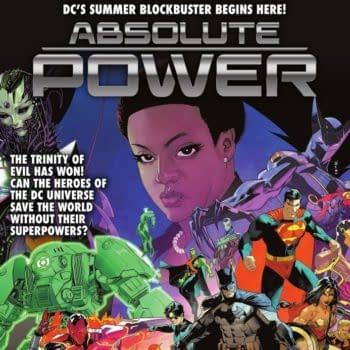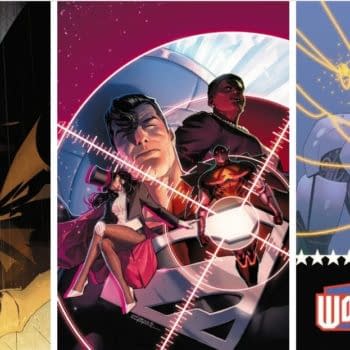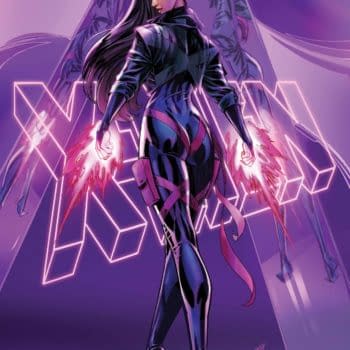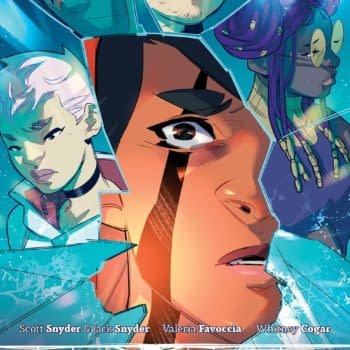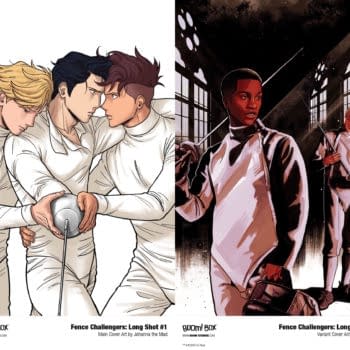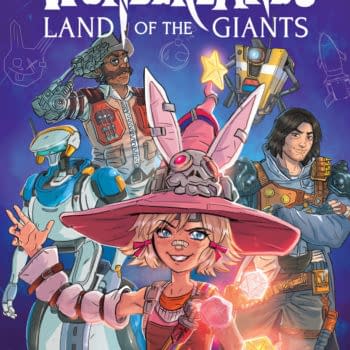Posted in: Comics, Recent Updates | Tagged: Matthew Hollingsworth, scott snyder, sean murphy, The Wake, vertigo
Fearless Enough To Win An Eisner – Discussing The Wake's Surprising Finale With Scott Snyder(SPOILERS)
The final issue of The Wake as a completed story by Scott Snyder, Sean Murphy, and Matthew Hollingsworth, arrived on July 3oth, a couple of days after the series won an Eisner Award at San Diego Comic Con 2014.
Just prior to the convention, I ran some excerpted quotes by Scott Snyder about the series, already looking back on it, and hoping that readers would grasp the purpose or intentions of the series once they saw it complete. And it is one of those books that must be viewed complete since every part is interlocking and has backward-flowing implications. Snyder spoke about the "fearlessness" that was typical of his work with Murphy, something they constantly pushed each other toward as creators, but also the thematic role of fearlessness in the book, a drive toward greater things.
Ironically, the book that is all about pushing the reader out of their comfort zones with genre and expectations is also the book that's leading me out of my comfort zone in publishing an article that isn't a type of thing I have a name for. This isn't an interview. This isn't a review. This is a very rambling conversation of the type that people often have in real life, but usually don't get printed in books or online. Scott Snyder suggested is was a "discussion". That works. It was a very late night discussion that probably plumbed the depths on just how informal a "discussion" can get.
This was what got said when Scott Snyder and I talked about the final issue of The Wake, a book that I have always predicted was going to hold a special place on a library shelf as a turning point in the creation of genre stories because no librarian would know where to put it. But hopefully, in time, other books would join it in its isolation and those books, I have no doubt, will be the most tattered and least often returned on time books a couple decades from now. This discussion sheds some light on why that is going to happen:
Hannah Means-Shannon: The atmosphere that it creates at the beginning talking about dreaming and waking up, I think is amazing and perfect. Have you ever heard of a book that David Lynch wrote called Big Fish? It has this interesting quote about how you go fishing in your subconscious and you pull up these monsters and you're either too afraid to do it, or you do it. And what you have to do is keep going deeper until you get to the "big fish", which is talking about these things from the unconscious. And I was thinking about these things from the beginning (of the issue) talking about waking and dreaming and whether they are going to bring these things to the surface or not, or go back to sleep as you said, and forget.
Scott Snyder: That speaks to a lot of the things we were trying to touch on in the series…That's really the purpose of the book is to say "We all have this sense and I think we all have this strange feeling of restlessness and homelessness, and the book gives this fun, concrete answer to it". But if you take that away and know that's part of the book, part of the fiction of it, it's meant to speak to the fact that I think we all do feel sometimes that the truths that are out there about how we came to be, the truths that are out there about how little we mean or how much we mean, those are these huge inscrutable and impenetrable elements in the world. We can do what we can to figure out tiny pieces of those truths, but they are terrifying.
And honestly a lot of it comes from some conversations I remember having with my wife when she started medical school. She was doing gross anatomy, and then she was doing surgery, and I kept being horrified at the things she was seeing, and saying, "How can you see that? The body open and yet look at people the same way, and think of the body as anything but machinery and muscle and tissue?" And she always said that the interesting thing is that the more you know and the more you see of the body, the more wondrous it is, the more mysterious. And I remember it really became this idea that we both believe that the universe rewards curiosity in some way.
That was always the stuff that Sean and I talked about at the beginning of this book, and I hope that's what this issue reveals. I hope that people love the sci-fi reveal that I think makes it original, is the idea of the "tears", but it's more important to me at the end of the day that they walk away feeling satisfied emotionally and intellectually with it.
There was a chemical in tears in the early days of humanity, because I've always been interested in the idea that there are certain biological functions which we still don't understand the purpose of. So, sleep we've learned a lot about, but things like yawning, there's no big purpose to it. And crying is one of those things that the function of it, the utility of it, is still unknown. There are guesses, like maybe back in the day, it was a sign of submission, that tears coming out of your eyes would signal that you were defeated, but really nobody knows and so it's such a big part of our emotional lives that I thought it would be fun to hinge the sci-fi element on that and have it be that there was this chemical in tears that it helped us forget within one generation what we had done. And that would dissipate over time. That it's a holdover, a vestigial behavior.
It's because what we like to do is be at rest and feel at home. But on this one planet, in this one place, out of all the millions of times we've done it, something went wrong, and we decided not to forget. And in doing so, we still forgot, but we created this scar in the sense of curiosity and restlessness and wanting to know things bigger than the facts in front of us.
HMS: The mermen, they recognized there was some sort of benefit in this not forgetting. They were impressed by it. They saw that it created something stranger and bigger, like a push toward greatness?
SS: This strange branch in the evolutionary tree, the mermen, become a kind of mirror for us. This strange thing underneath the water that looks and sees us. And it fights us. They are really the true indigenous intelligent species here, is the idea.
HMS: You were talking about wanting to surprise people. Honestly, what I'm most surprised by out of lots of things is the tone of this last issue, because I feel like it was kind of concealed and you kept that in question. It's the positivity. I think a lot of people write sci-fi stories, where some truths are revealed, but it returns to a status quo where some things sink back down. And I was always not sure how this story was going to turn out. I felt a kind of heaviness for humanity in the story. Because generally people are stupid, and they mess up, and that's it. And maybe we get a little bit of wisdom or understanding as a reader from looking at these stories, kind of like the Rime of the Ancient Mariner?
But the note that you strike through this issue, and it's like it's all one moment happening at the same time in this last issue, is such a rising tone that I felt incredibly surprised and incredibly relieved. Because it left me with a feeling of possibility. And that's a lift, a big lift. As a reader, I was grateful for that. And it is entirely contrary to genre expectations, which I guess would make you happy to hear because you want to break them, and take them in different directions. Because these big Odyssey-like epics usually have a pretty grim sense of gaining knowledge but then, "Yeah, well, things are just kind of crap anyway" at the end.
SS: Yeah, 100 percent. Honestly, we were trying to switch it. That's why the middle of the book, Issue #5 is this incredibly depressing, black moment. You would think there that they would win, they'd beat the creature, and you'd get the big uplift, but instead we go black. And then here, the plan was always to try to uplift and have it be a book that you would hopefully walk away from feeling a sense of possibility, or a sense of challenge to do something that is outside of your comfort zone in some way. The odd thing about the book, and honestly I'm so grateful to readers that it's done as well as it has, is that it was always meant to be a book where Sean and me and Matt were going to do something together that pushed us to be more elastic in our storytelling and make us uncomfortable and laugh.
We'd try to work our way out of boxes that we created for each other. That was always the purpose of the book from "Go". This place that we would have to be as crazy as we could manage while still keeping it coherent plot-wise. To have it be as supported by readers as it has been is really overwhelming for all of us. We were all a bit shocked at first. So I really hope that people walk away from the book feeling excited and uplifted and exuberant. It's meant to be a book that says "Go forth and explore". It's meant to be defiantly exuberant, the whole book, in its own way.
HMS: You know what's weird, though it's kind of hard to articulate, is that the things you are trying to display and portray in the book, almost kind of happen to the reader, like in that children's movie, The Neverending Story. Because it almost becomes a challenge to the reader after all of that suffering and difficulty in the story, asking, can they take that step to believe? To believe at the end in the possibility, in the future. And it's hard. I don't mean it's difficult to maintain belief, but the reader has to almost make a choice with the characters to step out into that bigger reality at the end and you feel like you've made that decision, too. It's very interesting.
SS: Yes, it's meant to turn on its heel. Sean and I both wish we'd had more room for the whole book. We wanted to go past that. I wish we had room to explore a lot of the world after that. We want to do a short about Dash the dolphin and the drone parrot and have that. I'd love to return to the world itself. I miss Leeward tremendously. I want to explore all the countries we didn't get to.
HMS: Well, I didn't mean that there needed to be more explained necessarily, though I hope you do. I just meant that I think the book has a positive effect on the reader in that I think it encourages them to step out of their own comfort zones just by reading it.
SS: You know, was trying to make a list for myself of the things that we did as challenges for each other that were fun. For me, it was to open and close with these insane teasers of what was coming, like opening by showing Leeward with her sonic dolphin…
HMS: I kept wondering what was going to happen with that! I kept thinking, "When it that moon going to be all fucked up and what's going on with that?"
SS: All of that. Trying to show the Storyteller in the first issue, with his device and in the second half, eliminating those. And in every other book that I've done, I'm obsessive about trying to keep a balance. I never start an arc with narration and don't end with it, so here instead I took the first half and made it a mixture of genres that shouldn't really go together in certain ways, with horror, deep-sea sci-fi, mixing that from Godzilla to The Abyss, and then mixing that with pirate adventure in the second half. Everything was just like, "If you think you shouldn't do it, do it".
It was everything that as a writer, for me, would be challenging and scary, and make me use what I'm comfortable with and use it in a different way that made me uncomfortable. And Sean, similarly, I know what Sean loves to draw, and then I pushed him into drawing things he was uncomfortable with. Like the water itself. I knew he was uncomfortable with so much water and not having cities and tech, and then pushed him into designing things by suggesting, "Well this ship is going to have a space shuttle attached".
And the challenge for him was keeping things realistic enough to make the book look believable, but for me it was to push into an area that was going to be as elastically imaginative in its inventions that it would be almost the opposite. It was almost as if he kept his art from being completely ridiculous as at the same time, it challenged me to be as ridiculous as possible. I miss it tremendously already. It was so much fun. Sean and are going to do another thing working together, I can't say what. I'm so excited.















